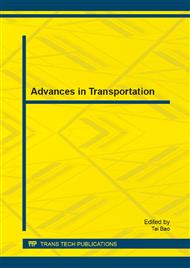p.1179
p.1183
p.1189
p.1194
p.1199
p.1204
p.1211
p.1215
p.1219
Passenger Waiting Time and Behavioral Adaption to Suburban Bus Timetable
Abstract:
Timetable-independent and timetable-dependent passengers relative waiting time were calculated based on data collected at nine stations of three bus lines in Jiangqiao area of Shanghai. Travel purpose and ride frequency should have an important influence on behavioral adaption to published timetable of suburban bus lines. Timetable-independent and timetable-dependent passengers arrival rates both fitted Johnson SB distribution well with a K-S test. The left skewed distributions suggested a large share of passengers, especially commuters who had great dependence on timetable, do schedules to reduce their waiting time due to long headways. Passengers of bus line without timetable appeared to arrange arrivals near the scheduled departure times according to past experience.
Info:
Periodical:
Pages:
1199-1203
Citation:
Online since:
January 2014
Authors:
Price:
Сopyright:
© 2014 Trans Tech Publications Ltd. All Rights Reserved
Share:
Citation:


